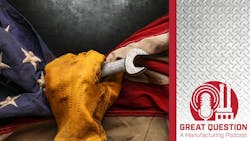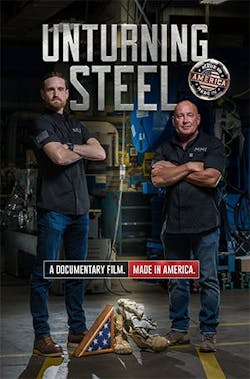Podcast: Helping veterans transition from the military to manufacturing
Bill Leahy is the Chief Executive Officer at Renaissance Reliability, a veteran-owned and operated reliability and maintainability engineering consultancy dedicated to American manufacturers. Paul Lavoie is the Chief Manufacturing Officer at the State of Connecticut and is committed to helping manufacturers take advantage of market opportunities to grow their businesses and solidify Connecticut’s reputation as the Silicon Valley of advanced manufacturing.
The two worked closely on Unturning Steel, a documentary that helps provide service members with a path forward after returning home. In the film, Bill sets out on a hero’s journey to help his fellow veterans bring their talents to American manufacturing. Together with the University of Tennessee-Knoxville, Bill has created a new offering that provides veterans the support and training they need to find purpose in American manufacturing.
Bill and Paul recently spoke with Plant Services editor in chief Thomas Wilk about their work with veterans and how their initiatives are helping to close the skills gap in manufacturing in North America.
Below is an excerpt from the podcast:
PS: Bill, we'll start with you. Since the last time we talked, tell us a little bit about how we got from there to here – there being last year, a movie in mind but nothing in place, and to here being we've got something to show this year at the Marcon conference coming up.
BL: I'll give the abbreviated version of this because it could take a while and I'll start with the tragedy that spurred us on this journey. In December 2022, my brother Major Sean Patrick Leahy, U.S. Marine Corps committed suicide during his transition out of service while working in manufacturing. That event had a profound effect on me, my family, the factory Sean was working at, and we made a determination that we needed to do something about it.
Unturning Steel was born from that and we actually worked with Medalcraft Mint, which is where Sean was working, to launch the project. The essence of it is we are taking service members before they start their transition out of the military, we bring them into manufacturing, train them, inculcate them, do everything to prepare them for a successful career in manufacturing from start to finish at no cost to them. And what we really want to do is set the conditions for success so that the three things we recognize that veterans need when they transition – community, certainty, and purpose – through our program, we're going to give them all three.
PS: That's a great recap and summary of what we talked about on the last podcast, and I'll put the previous episode links in the podcast notes for everyone. Let me turn to Paul though. Paul, this is our first time meeting and talking. Tell us a little bit about yourself and your work with the State of Connecticut, and especially how you found Bill out there and began working on the project with him.
PL: Sure Tom, I am Connecticut's chief manufacturing officer. I am appointed by the governor, so Governor Ned Lamont appointed me to this role in February of 2022, and I'm part of the executive branch of government here in Connecticut.
Connecticut is the only state that has this role. And my job is to identify some of the key challenges in the manufacturing sector, and then to be able to work using all of the state’s assets to help deliver solutions to those challenges. Of course, we all know all across America, but certainly in Connecticut as well, the lack of an available and skilled workforce is the number one issue. 86% of the manufacturers in Connecticut cite that as the number one issue that's preventing them from growing. So my job is to figure out how we're going to solve that problem.
When I look at that, I look at underserved communities, people who aren't typically in manufacturing jobs but would easily transition into those jobs. And specifically I'm looking at four areas: women, second chance reentry people, neurodiverse people, and military veterans. I had read an article about Bill and the work that he was doing, certainly as he was motivated by the horrible tragedy with his brother, and it struck a chord with me. I hunted him down and reached out to him, and when he came back to Connecticut, we sat down. Clearly, what Bill wants to do lines up perfectly with what I'm doing here at the state level.
And I'm a huge collaborator. Bill will tell you he's got a couple of contacts with some people that run manufacturing businesses. There's a banker who's a veteran that's interested in getting folks into manufacturing as well. We're in the process right now of just really building this consortium that's going to help manufacturers solve their challenge by making sure that they have the availability of veterans to transition right into the workforce. And again, Bill is spot-on with the three things that they need and we can provide. The State of Connecticut can work with folks like Bill to help provide what our military veterans are looking for as they transition into the private sector.
PS: I knew a friend in high school who served in Iraq in Gulf War I and Gulf War II, and he was a helicopter pilot and mechanic, and he transitioned to the workforce as now a trade mechanic in manufacturing. He’s someone who saw a lot of things, and not all of them pleasant, while he was serving the country, and then came back and there was a pathway to employment that he could leverage the skills he learned while serving and move right into a private sector job. It’s great to see these programs now developing even more pathways for people who are returning from service to move back into the private sector.
PL: Connecticut has this unique opportunity. We're #2 in the country in defense spending on a per capita basis, and we're number #1 in aircraft engine manufacturing, and #2 in shipbuilding, between (General Dynamics) Electric Boat; Pratt & Whitney, who makes the F135 engine for the F35 fighter (and we all know Electric Boat is making submarines); and Sikorsky, who makes the Blackhawk helicopter and the CH-53 helicopter. Bill and I have talking about this. You want to talk about providing purpose and meaning, how about you go from serving in the military to going to work, making sure that people that were just like you now have the most sophisticated, safest and best equipment available?
Senator Richard Blumenthal in Connecticut always says, “we never want a fair fight, never want a fair fight.” So we're always working to make sure that we're giving our veterans, we're giving our military, the best tools; and what better to have veterans working on giving the active military the best tools. You talk about giving meaning, giving purpose, it really aligns with the reason why I'm sure they went to serve in the first place.
PS: I can see how your passions both align really closely here, which must have made working on the movie interesting too. Can you share a couple of experiences or instances about the kind of work you did together to help make Unturning Steel a reality?
BL: We're slowly moving towards that. Coming out of the summer, the project that we ran, the program, that was a pilot program and it was an absolute mess. I will fully admit to that. But we did it quickly because we knew that there's urgency to the mission. So 22 veterans a day, one an hour, there's someone making a decision right now, and any time we waste is a lost opportunity to intervene in someone’s life in a positive way.
So yes, we did make a big mess but we were successful and we learned so much from it that now as we go to roll it out with the State of Connecticut and roll it out nationwide, we really have something solid to offer them and it all starts with this idea of matching. When I transitioned out of the service, I went through one of the hiring services that they present to you. There’s multiple options out there, but you end up doing about 12 interviews in a day at a DoubleTree somewhere outside of an airport, you get a bunch of offers, and you go and choose one. Really, you're crossing your fingers and hoping things work out for you, and that's a challenging prospect because when you're talking about certainty and how important that is, there's no certainty in that (process). Like I said, I picked my family up, we moved to Oregon hoping that things would work out.
The way it all starts, and this this where I think really the magic is, the first place we start is with the manufacturer. We go to them and find out what their exact needs are. The requisites they have open, the positions, the competencies they need, things they want to integrate into their operation – we get all that stuff first. Simultaneously, we're working with our pool of veterans through the (federal) SkillBridge program. We bring them in and we dive into it with them. What is their five year plan? Where do they want to be? What do they want to learn? What do they want to be doing? Where do they want to live? All of these things go into it and we take the needs of the manufacturer and needs of the veteran and merge them together as best we can.
We want to match before they get there, and then they have the three to six months to get to know each other, make sure there's a cultural fit, and they have the option to basically hire one another at the end of it.
Read the rest of the transcript
Like this episode? Listen to
About the Podcast
Great Question: A Manufacturing Podcast offers news and information for the people who make, store and move things and those who manage and maintain the facilities where that work gets done. Manufacturers from chemical producers to automakers to machine shops can listen for critical insights into the technologies, economic conditions and best practices that can influence how to best run facilities to reach operational excellence.
Listen to another episode and subscribe on your favorite podcast app
About the Author

Thomas Wilk
editor in chief
Thomas Wilk joined Plant Services as editor in chief in 2014. Previously, Wilk was content strategist / mobile media manager at Panduit. Prior to Panduit, Tom was lead editor for Battelle Memorial Institute's Environmental Restoration team, and taught business and technical writing at Ohio State University for eight years. Tom holds a BA from the University of Illinois and an MA from Ohio State University

